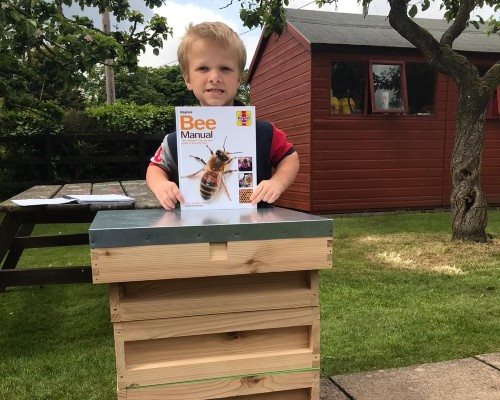Meet a boy, buzzing with ambition, on an important trial at Evelina London
Posted on Thursday 10th September 2020

Samuel with his bee hive
A primary school boy is realising his dream of becoming a bee keeper following his participation in an international drug trial at our hospital.
Samuel has achondroplasia, a rare genetic condition which causes dwarfism. It particularly affects the growth and development of long bones in thighs and upper arms.
Around one in 25,000 people are born with achondroplasia. While it leads to short stature, it can also cause health complications such as spinal cord compression, sleep apnoea, bowed legs, a curved lower spine, ear infections and breathing problems, all of which often require invasive surgery to treat.
Evelina London is a specialist centre for children with achondroplasia and nine-year-old Samuel is one of 10 children at our hospital who have taken part in the global trial of the drug vosoritide to see if it could help bone growth by comparing it with a placebo. In a paper recently published in medical journal The Lancet, the study’s authors found the drug was an effective treatment to increase the growth rate in children with achondroplasia.
Samuel has twin 12-year-old sisters and a six-year-old younger sister, and is an avid bee-keeper after getting a hive and bees for his ninth birthday. He also enjoys playing football with his friends and being outdoors.
Samuel’s mum, Kristina, said that since he started taking the drug in January 2018, he has grown fifty percent faster than expected for a child of his age with achondroplasia, and is now enjoying running his own bee hive and playing football.
“At the beginning, we didn’t know if Samuel was on the placebo or the actual drug. We knew it might not help our son, but the research might benefit the next generation of children.
“We joined the trial not so much for Samuel’s growth as for the potential health benefits – we wanted to help Samuel in his future in any way we could.
“Previously, I wouldn’t need to buy Samuel new clothes because he didn’t really grow out of them. Now I have to buy him trousers more frequently and his shoe size is getting bigger.”
“Samuel’s limbs are straight, his hands and feet are bigger, he has great stamina and he is a healthy young man.”
Samuel has daily injections of vosoritide, a regime which Kristina admits is not always easy. But, she says, Samuel has been actively involved in the decision to take the drug.
She added: “While Samuel is happy in his own skin, he does want to be taller. He has been involved in the decision-making process every step of the way. I’ve told him he can stop this at any time, but he wants to continue on the drug, for now."
Kristina, 41, regularly visited schools to raise awareness of achondroplasia and has written a children’s book, Strong and Mighty Max, about a child with the condition.
A total of 119 children aged 5-18 from 24 sites in seven countries took part in the blind trial, where they had daily injections at home over a year. Half the children were on a placebo, while the others received the drug. The trial measured how quickly the children were growing against their previous growth rate, and against those who had received the placebo. It found that those on vosoritide grew faster and closer to that of average stature children than the children who had not had the treatment
Dr Melita Irving, a consultant clinical geneticist, led the study at Evelina London. She said: “Samuel is such an energetic, lively young boy who is so inspiring. It’s wonderful to see how he has thrived.
“This trial assessed if vosoritide was firstly safe to use, and if it improved the rate of growth for the children taking it. It was successful in both cases, with the children on the drug growing faster than those not taking it.
“Increasing the bone growth rate has a significant improvement on these children’s lives – they will need fewer operations, their general health is improved and it’s easier for them to do basic activities like getting themselves dressed. This allows them to live independently and to the full.”
Kristina said that while it’s not known how Samuel will grow once he hits puberty, they have been pleased with the results so far.
She said: “This drug is a big breakthrough for the next generation of young people. It’s about the bigger picture, and I’m really proud of Samuel for taking part.
“His dream is to become a professional bee keeper with 100 hives and to have a farm. Samuel is so entrepreneurial and is ambitious, he could do anything.
“We’re so thankful to everyone at Evelina London, who have been brilliant. They are like family to us. Melita is an excellent doctor who has such a real passion for children.”
The trial was led by Melbourne’s Murdoch Children’s Research Institute.